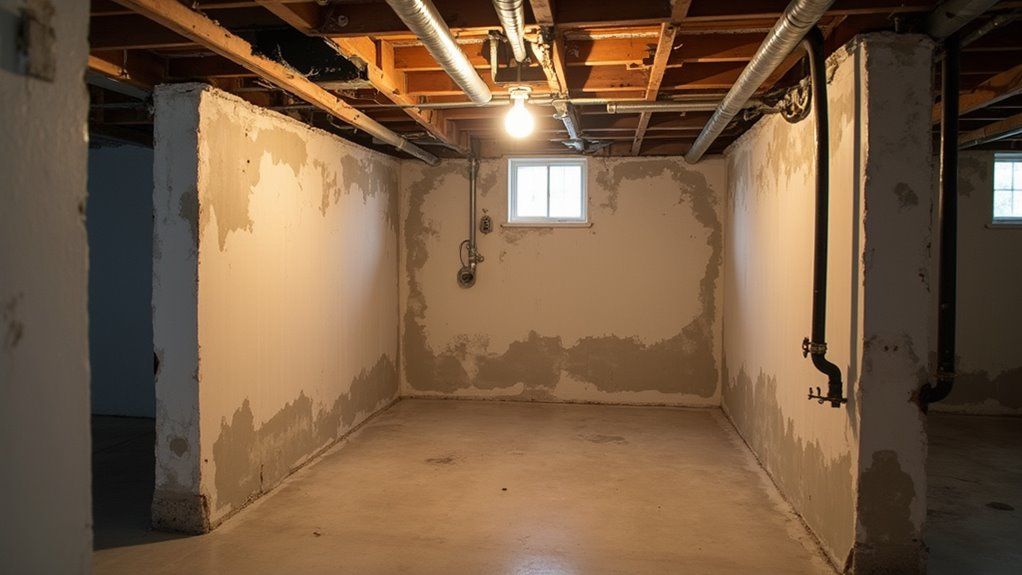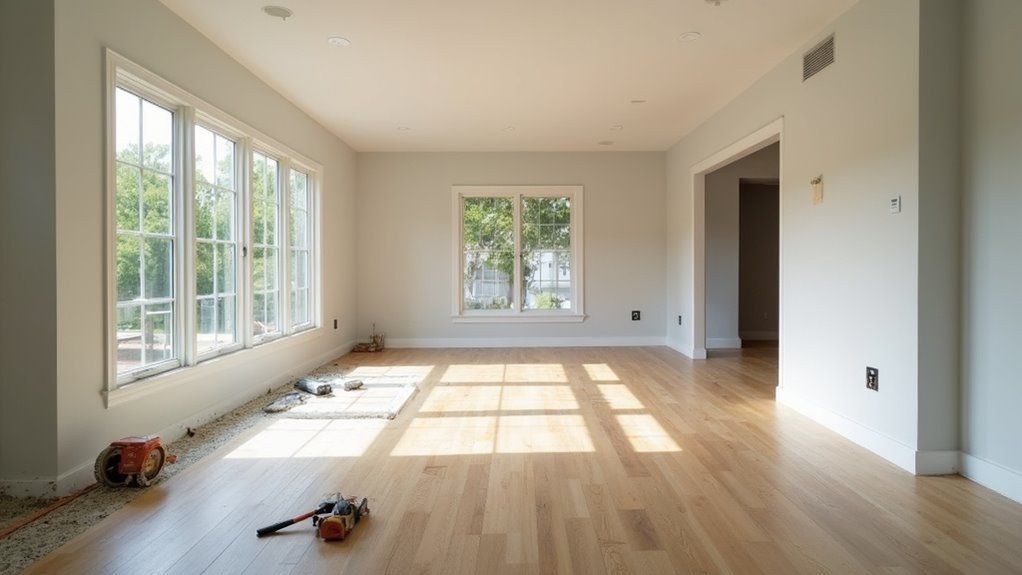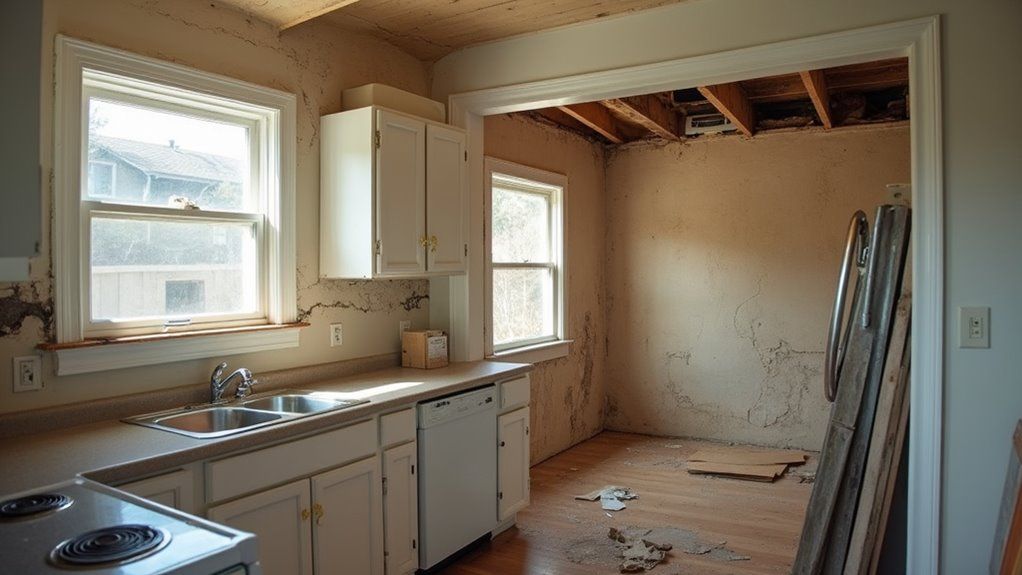Can You Sell a House With Unpermitted Work?

Navigating the murky waters of unpermitted home improvements can feel like walking through a minefield for sellers. Unpermitted work lurks in countless homes across the country, creating anxiety for owners looking to sell.
These unauthorized renovations can delay closings, slash property values, and even trigger legal consequences. Addressing permit issues early can save you thousands and ensure a smoother selling process.
You can sell a house with unpermitted work, but you must disclose known violations to potential buyers. Failure to disclose unpermitted renovations may result in legal liability, reduced selling price, or complicated negotiations with cautious buyers.
In this blog I will explore everything related to selling homes with unpermitted work.
Key Takeaways
- Yes, you can sell a house with unpermitted work, but full disclosure is legally required.
- Selling “as-is” with known unpermitted modifications minimizes legal risks but may lower the price.
- Applying for retroactive permits can help bring unpermitted work into compliance before selling.
- Buyers or lenders may require inspections revealing permit issues, potentially affecting the sale.
- Working with real estate professionals and offering credits can facilitate a smoother transaction despite unpermitted work.
What Is Unpermitted Work in Real Estate?

Unpermitted work in real estate refers to renovations or upgrades done without obtaining the necessary city permits.
Common examples include room additions, rewiring, and plumbing changes. Identifying these issues early helps you assess legal risks and powerful costs before selling.
Definition and Common Examples
Unpermitted work includes any renovations done without required building permits. Homeowners often skip permits for room additions, garage conversions, electrical rewiring, and plumbing modifications.
These violations can result in code compliance issues and potential fines up to $10,000 in some jurisdictions.
The consequences are significant for property sales.
Buyers may demand discounts or walk away completely when they discover unpermitted work. Insurance companies might also deny claims related to these modifications.
Furthermore, mortgage lenders often require all structures to be properly permitted before approving loans. This reality makes unpermitted work a major obstacle in the real estate transaction process.
Legal Implications of Unpermitted Work
Unpermitted renovations create serious legal and financial risks. Homeowners may face substantial fines, building code violations, and potential lawsuits for non-compliant work.
You must disclose any unpermitted modifications when selling your property. Failing to disclose can trigger buyer lawsuits, monetary damages, or contract cancellations.
Furthermore, your insurance may deny claims related to unpermitted areas. Local authorities might require removal or expensive retroactive permitting of non-compliant work.
In some jurisdictions, unpermitted work can complicate property tax assessments and future sales. As a result, always obtain proper permits before starting any renovation project.
How to Identify Unpermitted Renovations
Compare your property’s current layout with permit records from the City of Tulsa Permit Center. Look for rooms, walls, or additions that don’t match official documents.
Check electrical outlets, plumbing fixtures, and HVAC systems for professional installation quality.
Local building codes require permits for structural changes, electrical work, plumbing modifications, and most renovations exceeding $1,000 in value.
Recent inspections might flag concerning workmanship or safety issues. Professional home inspectors can spot telltale signs of unpermitted work during evaluations. This knowledge protects buyers from future legal complications and unexpected repair costs.
Sellers benefit from transparency that prevents deal-breaking discoveries during closing processes.
Can You Legally Sell a House with Unpermitted Work?

You can sell a house with unpermitted work in Oklahoma, but you’re required to disclose it.
Failing to do so exposes you to legal risks, including lawsuits and contract rescission.
Proper disclosure and transparency are essential to avoid costly penalties and ensure the sale complies with state law.
Disclosure Requirements by State
Yes, you can sell a house with unpermitted work, but you must disclose it to buyers.
State laws require complete disclosure of all known unpermitted work on your property. This applies regardless of when the work was completed or who did it.
Your transparency protects both you and the buyer from future legal issues. Complete disclosure helps avoid potential lawsuits and financial liabilities after the sale. Furthermore, honest communication builds trust with potential buyers.
Failure to disclose material defects, including unpermitted work, may result in legal consequences. When in doubt about what to share, consult with a real estate attorney.
Potential Legal Consequences of Non-Disclosure
Sellers who hide unpermitted work face lawsuits, financial damages, and contract cancellation. Oklahoma law holds sellers liable for undisclosed unpermitted renovations.
You might pay substantial fines and repair costs to bring properties up to code. The property’s value often decreases when buyers discover unpermitted work later.
Furthermore, your reputation as a trustworthy seller suffers permanent damage. Legal consequences may include civil penalties up to three times the actual damages.
In some cases, insurance companies reject claims related to unpermitted areas. Being honest upfront protects you from these serious legal and financial troubles.
What Are the Risks of Selling Without Permits?

Selling without permits exposes you to liability risks, including powerful lawsuits and fines if issues surface later.
It can also cause problems with your home insurance, leading to claim denials or coverage gaps.
Additionally, unpermitted work often reduces your property’s value and marketability, making it harder to get full price.
Liability Issues for Sellers
Sellers face legal risks when selling homes with unpermitted work. You must disclose all known unpermitted modifications according to state laws.
Failure to disclose can result in lawsuits, financial penalties, and canceled contracts. Your reputation may suffer as well.
Honesty serves as your best protection in real estate transactions. Buyers appreciate transparency about property conditions. Furthermore, clear disclosure builds trust with potential purchasers.
Courts typically side with buyers when sellers conceal significant property defects or illegal modifications. The financial impact of such judgments often exceeds any savings from hiding issues.
Impact on Home Insurance
Unpermitted work can void your home insurance coverage. Many insurers deny claims related to unpermitted work that causes damage or safety issues.
Insurance companies may cancel your policy if they discover code violations during claims investigation. This leaves you financially exposed.
When you sell a home with unpermitted modifications, the risk transfers to buyers. They might face insurance gaps for any issues stemming from these unauthorized changes.
Furthermore, this situation can damage your reputation as a seller and lead to potential legal consequences.
Reduced Property Value Considerations
Unpermitted work significantly lowers your home’s appraised value. Appraisers exclude unauthorized improvements when calculating official square footage and overall valuation.
Most appraisers must follow strict guidelines that prevent them from counting unpermitted spaces in total home value. This reduction directly impacts your selling price and property marketability.
Potential buyers typically offer less for homes with unpermitted modifications due to perceived risk.
Lenders also restrict financing options when discovering unauthorized work. Financial institutions often reduce loan amounts or require remediation before closing. These complications frequently cause delays in the sales process.
How to Sell a House with Unpermitted Work?
You can pursue retroactive permits to bring unpermitted work up to code, but expect inspections and powerful costly repairs.
Alternatively, sell “as-is” with full disclosures, clearly outlining known issues to buyers.
Work with real estate pros to navigate negotiations, price adjustments, and buyer expectations effectively.
Obtaining Retroactive Permits
Homeowners can apply for retroactive permits for unpermitted work through the Tulsa Permit Center. This process requires complete documentation, including detailed plans of the completed work.
You must schedule official inspections to verify code compliance once your application is submitted.
Any violations found during inspections must be corrected before approval. The inspection team will provide specific requirements for bringing work up to code.
After corrections, a final inspection confirms compliance. Securing retroactive permits removes legal obstacles to your home sale.
Buyers feel more confident purchasing a properly permitted property. Most lenders also require permit verification before approving financing.
Selling “As-Is” with Proper Disclosures
Yes, you can sell a house “as-is” with unpermitted work, but you must disclose everything. Always document all known unpermitted modifications in writing. This protects you legally while giving buyers clear expectations.
Oklahoma law requires sellers to disclose material defects even in as-is sales. Your honesty creates trust with potential buyers. Some buyers may walk away after learning about code issues. Others might still make offers with the information in mind.
Complete transparency prevents future lawsuits and ensures a legally sound transaction. The right buyer will appreciate your honesty about the property’s condition.
Negotiating with Potential Buyers
Adjust your asking price when selling a property with unpermitted work. This creates room for buyers to address potential compliance issues.
Consider offering specific credits for remediation costs that buyers will face. Cash buyers often present fewer complications since they bypass lender requirements regarding permits. The absence of financing contingencies simplifies the transaction process.
Always disclose unpermitted modifications upfront to maintain transparency. Your honesty builds trust with potential buyers.
This approach prevents future legal problems related to non-disclosure. Many buyers will appreciate your straightforward communication about the property’s status.
Working with Real Estate Professionals
Real estate experts provide crucial help when selling homes with unpermitted work. They understand disclosure requirements and legal obligations.
These professionals can verify permits and identify potential issues before listing. Their experience protects you from liability problems.
Agents ensure all documentation meets legal standards. They communicate honestly with potential buyers about unpermitted areas. State laws require sellers to disclose known defects and unpermitted work to avoid fraud claims.
Furthermore, these professionals can recommend contractors for bringing non-compliant work up to code.
Professional guidance reduces stress during inspections and negotiations. In many cases, their expertise helps maintain your asking price despite unpermitted issues.
What Options Do Sellers Have for Unpermitted Work?
You have several options to address unpermitted work before selling, including fixing the issues and obtaining permits upfront.
Alternatively, you can offer buyers credits for repairs or reduce your asking price to offset risks.
Selling to cash buyers who are willing to handle code violations is also a viable strategy.
Fix and Obtain Permits Before Selling
Yes, you should fix code issues and get proper permits before selling a home with unpermitted work.
The process begins at the Tulsa Permit Center where you submit remediation applications.
Property owners must schedule official inspections to verify all work meets current building codes. Any required repairs must be completed for final approval.
This approach offers several benefits. Your home will likely sell for a higher price. Legal risks decrease significantly when everything is properly permitted.
Buyers also feel more confident purchasing a fully compliant property.
Offer Credit to Buyers for Remediation
A credit to buyers for remediation costs can help sell properties with unpermitted work. This approach compensates buyers for future expenses to bring the property up to code.
Legal requirements for such remediation vary by jurisdiction, but typically involve obtaining retroactive permits. The credit amount should reflect actual repair costs based on contractor estimates.
This strategy benefits both parties by allowing the sale to proceed without delays. Buyers receive funds to address the issues properly.
Most importantly, this approach reduces legal liability for sellers while providing transparency about property conditions.
Reduce Listing Price to Compensate
Yes, lowering your asking price can help sell a property with unpermitted work. This strategy acknowledges the decreased marketability and value issues.
You can reduce the price to reflect the costs buyers face for compliance. Offering repair credits gives buyers funds to fix code violations after purchase.
The price reduction should account for both remediation costs and any financing limitations.
Cash buyers often present the best option for these properties. They typically face fewer hurdles than those needing traditional financing.
The adjusted price should consider both appraised value and comparable properties in your market. Remember that most lenders require code compliance before approving loans.
Selling to Cash Buyers
Cash buyers often purchase properties with unpermitted work without hesitation. They accept the associated risks and handle permit issues later. This option provides sellers a straightforward exit strategy without fixing violations first.
Cash buyers and investors typically focus on potential profit rather than permit status. They understand how to navigate these situations legally.
Meanwhile, traditional buyers usually avoid unpermitted properties due to mortgage restrictions.
In contrast to cash purchases, most lenders require proper permits before approving financing. This requirement effectively blocks conventional buyers from properties with code violations.
For this reason, targeting cash buyers can significantly expand your pool of potential purchasers.
Will Unpermitted Work Affect Your Home’s Value?
Unpermitted work can lower your home’s appraised value since appraisers often exclude unpermitted additions from square footage.
Lenders also require permits for financed transactions, and failing to have them can restrict or delay sales.
Ultimately, unpermitted modifications can significantly reduce your property’s market value and saleability.
Appraisal Considerations
Unpermitted work significantly lowers your home’s appraised value. Appraisers must exclude unauthorized additions from official square footage calculations.
This creates a gap between your perceived and official home value. Your property might appear less valuable than similar permitted homes.
Most lenders won’t finance properties with substantial unpermitted work. Additionally, these issues raise immediate concerns for potential buyers.
The marketability suffers when documentation problems exist. Future buyers may demand discounts or walk away completely.
Professional appraisers follow strict guidelines when evaluating homes with unauthorized modifications.
As a result, protecting your investment requires obtaining proper permits before selling.
Mortgage Lender Requirements
Yes, unpermitted work can prevent mortgage approval. Lenders require all home modifications to have proper permits and code compliance.
Most mortgage programs mandate that properties meet local building codes and have documentation for all improvements. Unpermitted work represents a significant risk to lenders.
Financial institutions conduct thorough inspections before approving loans. These reviews often uncover permit problems that homeowners didn’t address.
Furthermore, appraisers typically note code violations in their reports. To secure financing, homeowners should obtain permits retroactively or disclose issues upfront. In many cases, working with the local building department resolves these concerns.
Need to Sell a House with Unpermitted Work Fast? Contact Tulsa Home Buyers Today!
You can sell your house as-is to Tulsa Home Buyers today. Disclose all known violations to potential buyers immediately. Set a competitive price that accounts for the property’s condition. Offer renovation credits to make the deal more attractive.
Cash buyers and investors often accept properties with unpermitted improvements. These buyers typically close faster and may waive inspections. Furthermore, they understand the risks involved.
To move forward confidently, gather all documentation about the work completed. This preparation helps address buyer concerns upfront.
Frequently Asked Questions
Can Unpermitted Work Be Legally Hidden During Sale Disclosures?
You can’t legally hide unpermitted work during sale disclosures. You must honestly disclose all known defects, including unpermitted renovations, to protect buyers, avoid lawsuits, and stay compliant with Oklahoma law and Tulsa ordinances.
Are There Specific Permits Required for Common Home Renovations in Tulsa?
In Tulsa, you need permits for major renovations like room additions, rewiring, plumbing, or structural changes. Cosmetic updates don’t require permits. Always verify with city records to ensure compliance, and disclose unpermitted work honestly to protect clients and maintain trust.
What Penalties Exist for Selling a House With Unpermitted Work?
You face legal risks, possible damages, and contract rescission if you sell without disclosing unpermitted work. Fines, liability, and loss of buyer trust can also occur, so full transparency and proper permits protect both you and your clients.
How Long Does It Typically Take to Obtain Retroactive Permits?
Obtaining retroactive permits in Tulsa typically takes 30 to 60 days, depending on project complexity and inspection schedules. Act quickly, provide thorough documentation, and coordinate with city officials to expedite the process and serve your clients effectively.
Does Unpermitted Work Affect Eligibility for Home Insurance Claims?
Unpermitted work is a ticking time bomb for your insurance claims. It can cause coverage denials or reductions, leaving you exposed. Ensure proper permits are in place to protect your clients and uphold their peace of mind.
Ready to work with Tulsa Home Buyers?
Let's connect! We’re here to help.
Send us a message and we’ll be in touch.
Or give us a call today at (918) 516-8951


